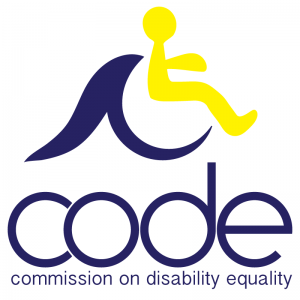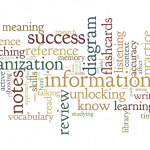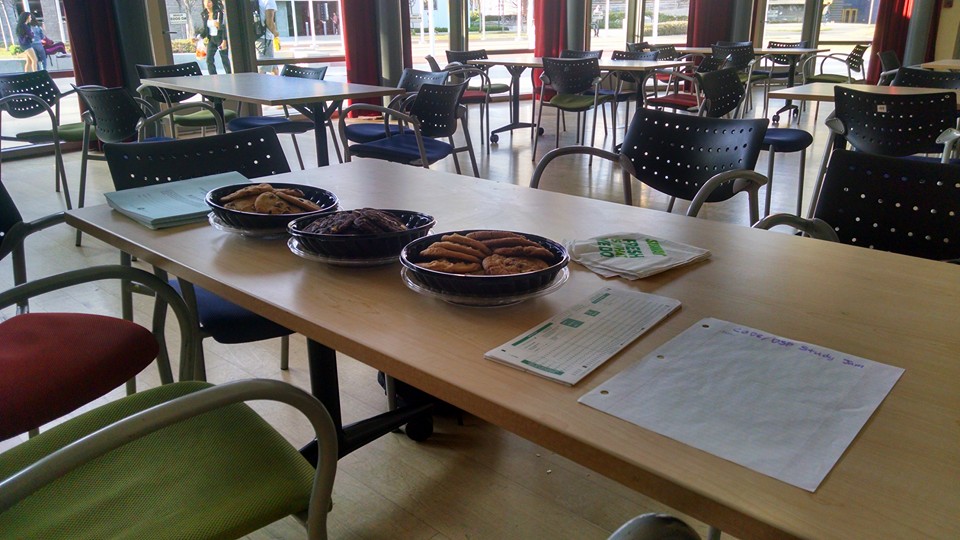INTRODUCTION
As in past years, the Commission on Disability Equality (CODE) dedicated itself to improving the status of students with temporary or permanent disabilities on campus and in the community. CODE’s work included outreach, networking, and exploring ways to increase retention and graduation rates, and promoting social, educational, and academic programs regarding the disabled student community. As always CODE was committed to advocating for disabled students and educating the campus community on the importance of equal access by raising disability issues, interests, and awareness on a local, state, and national level.
This year CODE Co-commissioners Steven Kwok and Brandon Lee focused on the implementation of a long overdue Alternative Transportation System for anyone on campus with a longterm or short-term disability.
ALTERNATIVE TRANSPORTATION PROJECT
UCSB has uncharacteristically lagged behind many of its peer institutions in implementing an alternative transportation system for students with a permanent or temporary disability which makes it difficult for them to attend classes and otherwise participate in campus life. CODE has worked on this problem for several years. Due to Steven and Brandon’s diligence, if all goes as planned an Alternative Transportation Project will launch during fall quarter 2016 with three student-driven pedicabs on regular routes similar to those use by AS Recycling’s route riders.
CODE described its work on their website and asked for student input to make the Alternative Transportation System a reality:
Alternative Transportation Project (Projected Launch Date: Fall Quarter 2016)
“The Alternative Transportation Project is a collaborative effort between many entities at UC Santa Barbara, including the Associated Students Commission on Disability Equality (AS CODE) and the Associated Students Senate. Using four modes of transportation, the project is designed to help students with permanent and temporary disabilities (e.g. broken legs, sprained ankles, etc.) get to and from class. The modes of transportation are pedicabs, golf carts, wheelchair-accessible vans, and vouchers for Lyft. However, in order to determine how to best use these four modes of transportation, we need to get an idea of the student need and student support for the Alternative Transportation Project.”
This text ended with a link to a questionnaire where students could let CODE know which modes of transportation would serve them best. This student input was critical in planning the system and the basis of CODE’s discussions with campus administrators and the UCSB Police Department during the planning process.
NEW CODE LOGO
Yes, CODE has a new logo. CODE worked with the AS Creative Media Unit to design the new logo. It was designed by AS student graphic designer Kai Walsh.

CODE ON FACEBOOK
CODE’S Facebook site is a campus resource that provides information about the physical, psychological, and social aspects of disability. Regular updates alert students and the campus community to articles, lectures, and activities that address issues and raise awareness.
ACTIVITIES
CODE DISABILITY AWARENESS WEEK
Disability Awareness Week is CODE’s most important event of the year. This year, it took place in May.
 CODE MEETINGS
CODE MEETINGS
CODE’S weekly meetings included discussion of variety of topics, including epilepsy, physical disability, visual impairments/blindness, obesity, ableism, hidden disabilities, depression and anxiety in college students,
CODE STUDY JAMS
CODE co-hosted finals study jams with the Disabled Students Program during winter and spring quarters. They provided blue books, Scantrons, and snacks in the Student Resource Building.

SRB Multi-purpose room
SHORT AND LONG TERM GOALS/AS VISION 2020
This year was a planning year that resulted in a clearly articulated 5-year vision for CODE. The plan is summarized on the CODE website. It’s reprinted here in its entirety:
Long-Range Plan
In accordance with Associated Students’ Vision 2020 Long-Range Plan, the Commission on Disability Equality in 2015 set several goals for itself in its own three-year long-range plan.
Short-Term Goals
Education: The commission will work to educate the student body on issues that affect people with disabilities, including but not limited to lack of accessibility, lack of sufficient mental health resources, lack of knowledge of invisible disabilities, ableism, etc.
Alternative Transportation Project: The commission will work with interested parties (e.g. University Administration, Associated Students, UCSB Athletics) so that the Alternative Transportation Project may be implemented and launched by Fall Quarter 2016
Disabilities Awareness Week: The commission will host a Disabilities Awareness Week each year to raise awareness about various disabilities, the history of legislation concerning people with disabilities. The commission may participate in any fairs that the AS Committee on Committees hosts throughout the year
Maintaining the Institutional Memory of CODE: The commission will keep records of its weekly activities to maintain the commission’s institutional memory. The commission will hold debriefings after each of its events, and a report of each debriefing will be put into the commission’s records
Accessibility Audits: The commission will conduct accessibility audits throughout each quarter to ensure that people who use wheelchairs and other mobility devices can get to their respective destinations
Advising: The commission will represent the voices of their constituents before the Associated Students Senate, the Student Fee Advisory Committee (SFAC), and the Campus Advisory Committee on Campus Access
Long-Term Goals
Mental Health Accessibility: The commission will collaborate with the Commission on Student Well-Being (COSWB), Take Back the Night (TBTN), Active Minds, Associated Students Office of the President (ASOP) Mental Health Coordinator, Student Mental Health Oversight Committee, and the Mental Health Peers to explore how the student body’s access to mental health services on campus can be improved. The collaborative group will also explore how the state of mental health services can be improved.
Mobility Devices Storage Space: The commission will work to create a space for mobility devices (e.g. crutches, wheelchairs, knee scooters) so that students who become temporarily disabled can have access to these devices. The commission will also explore sources of funding for the creation of the storage space and the purchase of the mobility devices. The commission will develop a system to loan (or rent) out the devices, and to hold the recipients accountable for any damages the devices incur while in the recipients’ possession
Services Survey: The commission will create a survey to distribute to the people registered with the Disabled Students Program, as well as the general student body and faculty to determine the state of the services that the commission (or relevant entity) provides, and, based on survey responses, will make service improvements accordingly.
CODE Website Overhaul: The commission will overhaul its website so that students who visit the site can learn about the commission, its place within the Association, its officer board, its advisors, its projects, and its long-range plan. Completed 2016.
Disability Services Resource Guide: The commission will develop a resource guide so that students know where to go for the various resources they will need to accommodate their various disabilities. A compact version will be ready by the commission’s Disability Awareness Week.
Legal Code Changes: The commission will work with the Senate to implement any necessary changes to the commission’s Legal Code to reflect the expanding duties and activities of the commission.
Base Building: The commission will work to increase the general membership of the commission by tabling, reaching out to the Boards, Commissions, and Units (BCUs) in Associated Students; and Office of Student Life (OSL) groups, and reaching out to the Disabled Students Program (DSP) constituents
Advocacy: The commission will advocate for issues concerning students with disabilities, and will work with the External Vice President of Local Affairs (EVPLA), External Vice President of Statewide Affairs (EVPSA), and Student Advocate General (SAG) to further this mission. The commission will invite speakers to UCSB to speak on various issues, and will do research to stay up to date on the latest issues facing people with disabilities

Recent Comments